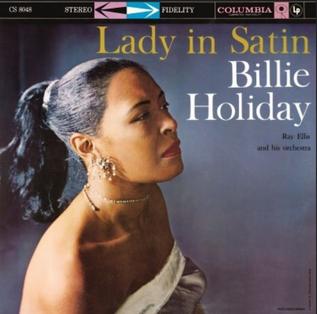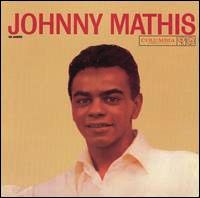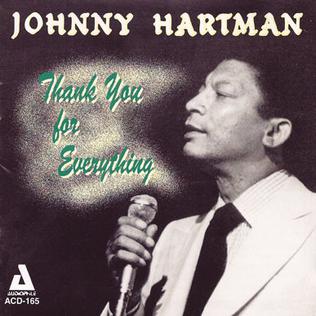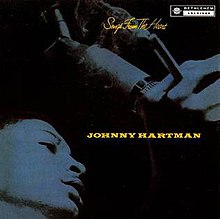
Lady in Satin is an album by the jazz singer Billie Holiday released in 1958 on Columbia Records, catalogue CL 1157 in mono and CS 8048 in stereo. It is the penultimate album completed by the singer and last released in her lifetime. The original album was produced by Irving Townsend and engineered by Fred Plaut.

John Maurice Hartman was an American jazz singer, known for his rich baritone voice and recordings of ballads. He sang and recorded with Earl Hines' and Dizzy Gillespie's big bands and with Erroll Garner. Hartman is best remembered for his collaboration in 1963 with saxophonist John Coltrane, John Coltrane and Johnny Hartman, a landmark album for both him and Coltrane.

The Complete Ella Fitzgerald Song Books were a series of eight studio albums released in irregular intervals between 1956 and 1964, recorded by the American jazz singer Ella Fitzgerald, supported by a variety of orchestras, big bands, and small jazz combos.
"They Say It's Wonderful" is a popular song written by Irving Berlin for the musical Annie Get Your Gun (1946), where it was introduced by Ethel Merman and Ray Middleton. A film version in 1950 again featured the song when it was performed by Howard Keel and Betty Hutton. More recently it was performed in an episode of The Marvelous Mrs. Maisel by Darius de Haas.

The Return of the Magnificent Seven is the second collaborative album between Motown label-mates The Supremes and Four Tops, released in 1971. The production only featured two covers compared to their first album together, The Magnificent 7, that included more than eight. Although the three albums the Supremes recorded with the Four Tops did not match the commercial success of the Supremes/Temptations duet albums, what they did have instead were original tunes, soulful lead vocals by Jean Terrell and Levi Stubbs and high production values in terms of arrangements and orchestration.

Perfectly Frank is an album by Tony Bennett, released in 1992 and recorded as a tribute to his longtime friend Frank Sinatra.

Concepts is a 1992 sixteen-disc box set compilation of the U.S. singer Frank Sinatra.

Charlie Parker with Strings is the name of two separate albums by jazz musician Charlie Parker, released in 1950 on Mercury Records. It is also the name of a 1995 compilation album released by Verve Records, containing all the tracks from both the 1950 albums, as well as additional material. The sessions place Parker in the context of a small classical string section and a jazz rhythm section, rather than his standard bebop quintet. They were Parker's most popular sellers during his lifetime, and were admitted to the Grammy Hall of Fame in 1988.

Lorez Alexandria was an American jazz singer, described as "one of the most gifted and underrated jazz singers of the twentieth century". She became established in the midwest before moving to Los Angeles in the mid-1960s. Jazz critics have compared her to Dinah Washington, Sarah Vaughan, Carmen McRae, and Ella Fitzgerald.

Johnny Mathis is the first studio album by vocalist Johnny Mathis that was released by Columbia Records in 1956. The subtitle A New Sound in Popular Song can be found on the back cover but not on the front of the album or the disc label; in fact, this Mathis LP has been referred to as "the jazz album".

Portrait Edition is a three disc box set compilation album released by Sony Entertainment and featuring songs recorded by American singer Jo Stafford. The album was released by Sony on August 30, 1994.

I Remember You is an album by pianist Hank Jones recorded in Paris in 1977 for the Black & Blue label.

All of Me: The Debonair Mr. Hartman is a 1957 album by Jazz singer Johnny Hartman. It was released on the Bethlehem label. The album was reissued in 2000 with four additional tracks, alternate takes of songs from the original album.

Annie Ross Sings a Song with Mulligan! is an album by vocalist Annie Ross with jazz saxophonist and bandleader Gerry Mulligan featuring performances recorded in 1957 and 1958 which were released on the World Pacific label.

A Man Ain't Supposed to Cry is a 1958 album by the American jazz singer Joe Williams arranged by Jimmy Mundy. It is an album of ballads and torch songs.

I Love Everybody is a studio album by American jazz vocalist Johnny Hartman, released in 1967 by ABC Records. It was produced by Bob Thiele and features arrangements and conducting by Jack Pleis and Oliver Nelson.

For Trane is a compilation album by American jazz vocalist Johnny Hartman that was released in 1995 by Blue Note Records. It contains material from two albums that Hartman recorded in Tokyo in 1972, Hartman Meets Hino and Hartman Sings Trane's Favorites. The original LPs were only available in Japan. For Trane marks the first time the songs have been released in the United States.

Thank You for Everything is a studio album by American jazz vocalist Johnny Hartman, released in 1998 by Audiophile Records. The material was originally recorded in mid-1976 for two episodes of Alec Wilder's National Public Radio series entitled American Popular Song. Each episode focused on one composer, and Hartman chose works by Billy Strayhorn and Cole Porter. Most of the songs from the two episodes are included on Thank You for Everything and marked the first time they had been commercially released.

















